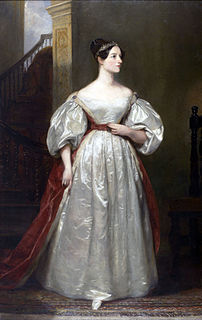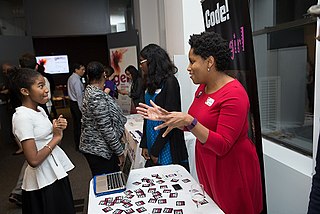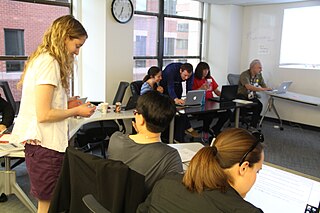 W
WThis is a timeline of women in computing. It covers the time when women worked as "human computers" and then as programmers of physical computers. Eventually, women programmers went on to write software, develop Internet technologies and other types of programming. Women have also been involved in computer science, various related types of engineering and computer hardware.
 W
WWomen in computing were among the first programmers in the early 20th century, and contributed substantially to the industry. As technology and practices altered, the role of women as programmers has changed, and the recorded history of the field has downplayed their achievements.
 W
WAfrican-American women were among early pioneers in computing in the United States. Generally, they were hired as mathematicians to do technical computing needed to support aeronautical and other research. They included such women as Katherine G. Johnson and Dorothy Vaughan, who had careers of decades at NASA. Among Johnson's projects was calculating the flight path for the United States' first mission into space in 1961. She is credited as co-author of 26 scientific papers. The practice in 1960 was to list only the head of the division as author. The crediting of Johnson as an author in a peer-reviewed NASA report is significant.
 W
WAnitaB.org is a global nonprofit organization based in Belmont, California. Founded by computer scientists Anita Borg and Telle Whitney, the institute's primary aim is to recruit, retain, and advance women in technology.
 W
WThe Association for Computing Machinery's Council on Women in Computing (ACM-W) supports, celebrates, and advocates internationally for the full engagement of women in all aspects of the computing field, providing a wide range of programs and services to ACM members and working in the larger community to advance the contributions of technical women. ACM-W is an active organization with over 36,000 members.
 W
WBlack Girls Code (BGC) is a not-for-profit organization that focuses on providing technology education for African-American girls. Kimberly Bryant, an electrical engineer who had worked in biotech for over 20 years, founded Black Girls Code in 2011 to rectify the underrepresentation of African-American girls and women in the technology industry. The organization offers programs in computer programming, coding, as well as website, robot, and mobile application-building, with the goal of providing African-American youth with the skills to occupy some of the 1.4 million computing job openings expected to be available in the U.S. in 2020.
 W
WComputer Engineer Barbie is the 126th career version of Mattel's Barbie doll. In response to poll results indicating strong support for computer engineers, the doll set was created and introduced in 2010. In 2014 Mattel apologized for the accompanying book, I Can Be a Computer Engineer, after internet complaints that it represented Barbie as incompetent in the field, needing the help of men.
 W
WDjango Girls is an international non-profit organization started by two Polish women, Ola Sitarska and Ola Sendecka, to inspire women from all backgrounds to get interested in technology and to become programmers, offering a safe and friendly environment. It is known for the free workshops it hosts to help women to learn to program and for its Django tutorial. It is often supported by the Python Software Foundation, and they often hold sessions at the Python Conference.
 W
WThe Edinburgh University Settlement (EUS) was a multi-purpose voluntary organisation established by University of Edinburgh in 1905. The Edinburgh University Settlement was part of a larger settlement movement which began in Britain with the founding of Toynbee Hall in London in 1886. EUS was liquidated in 2011 following bankruptcy.
 W
WGender disparity in computing has become a global concern due to the emergence of the Information Age. Main concerns arose due to the growing gender disparity in the field of computing. The field of computing increasingly has developed a gender gap. This gender gap has made the field become more male dominant. With the decline in women pursuing education within the field of computer science and women working in field, lack of diversity in field emerged. Concerns of improving perspective in the field, creating more diversity, and attempting to close the gender gap motivated public policy debates addressing gender equality due to the growing importance of computing and technology in society. This dialogue helped to expand information technology innovations and to reduce the consequences of sexism. Growing concerns about the disparity in computing has allowed for the rise of organizations creating their own initiatives to bring women into the field of computer science.
 W
WGirls Make Games is an American organization established in 2014 which aims to support and encourage girls to pursue careers in the video game industry. The organization runs annual summer camps open to young girls where they learn how to design and build a video game.
 W
WGirls Who Code is a nonprofit organization which aims to support and increase the number of women in computer science by equipping young women with the necessary computing skills to pursue 21st century opportunities. The organization works toward closing the gender employment difference in technology, and to change the image of what a programmer looks like. They host a seven-week Summer Immersion Program, a two-week specialized Campus Program, after school Clubs, and a New York Times best-selling Penguin 13-book series.
 W
W"Google's Ideological Echo Chamber", commonly referred to as the Google memo, is an internal memo, dated July 2017, by US-based Google engineer James Damore about Google's culture and diversity policies.
 W
WThe National Center for Women & Information Technology (NCWIT) is a 501(c)(3) nonprofit organization that works to increase the meaningful participation of girls and women in computing. NCWIT was founded in 2004 by Lucinda (Lucy) Sanders, Dr. Telle Whitney, and Dr. Robert (Bobby) Schnabel. NCWIT is headquartered in Boulder, Colorado at the University of Colorado Boulder. Lucy Sanders, who was inducted into the Women in Technology International Hall of Fame in 2007, is the current chief executive officer.
 W
WThe Petrie multiplier is a thought experiment or mathematical model invented by British computer scientist Karen Petrie, and first described by Ian Gent in 2013. The multiplier "shows that if the percentage of men and women in the room who make questionable remarks to the other sex is equal and the percentage of women in the room is lower than the percentage of men, then the average woman experiences far more sexist comments than the average man."
 W
WTech LadyMafia is a membership-based group of women in technology founded in 2011 by Aminatou Sow and Erie Meyer. The group was founded in part to increase visibility of women working in technology in response to popular articles about the lack of gender diversity.